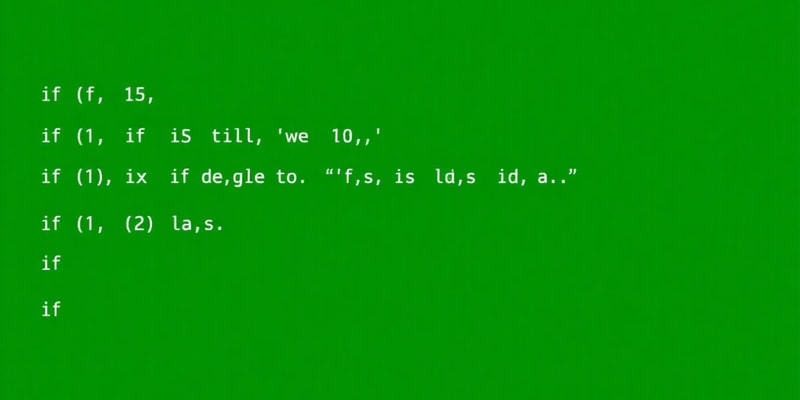Podcast Beta
Questions and Answers
A loop that performs an action until a condition becomes false is called a definite iteration.
False
Each repetition of action in a loop is known as an iteration.
True
An entry-controlled loop halts as soon as a condition is met.
False
Logical operators can be used to construct compound Boolean expressions in programming.
Signup and view all the answers
A selection statement cannot be used in conjunction with a break statement to exit a loop.
Signup and view all the answers
The format operator % can be used to format a sequence of data values.
Signup and view all the answers
When formatting float data values, the format specifier %.f is commonly used.
Signup and view all the answers
The Boolean data type can only represent three values: true, false, and null.
Signup and view all the answers
In Python, the comparison operator != is used to determine if two values are equal.
Signup and view all the answers
Selection statements enable a computer to make decisions based on conditions.
Signup and view all the answers
Study Notes
Objectives of Loops and Selection Statements
- Loops enable the repetition of actions a specified number of times or until a specific condition is met.
- Different types of loops include:
- Definite iteration: repeats actions a predetermined number of times.
- Indefinite iteration: continues until a stop condition is reached.
- Selection statements allow programs to make decisions based on conditions.
Definitive Iteration: The For Loop
- Each repetition in a loop is called an iteration or pass.
- A for loop is commonly used to repeat actions over defined ranges, like iterating through lists or strings.
Formatting Text for Output
- The format operator
%can be utilized to format strings, integers, and floating-point numbers. - For integers, use
%d; for floats,%.fis effective, where.${precision}is optional. - Example usage shows how to format and print exponentiation results clearly.
Selection Statements: If, If-Else, and Multi-Way
- If statements allow conditional execution based on a single condition.
- If-Else statements provide two possible execution paths based on whether the condition is true or false.
- Multi-Way if statements enable multiple conditional checks, such as assigning letter grades based on numeric grades.
Logical Operators and Compound Boolean Expressions
- Logical operators (
and,or,not) facilitate the creation of complex conditions in statements. - Compound expressions streamline error checking, allowing multiple conditions to be evaluated efficiently.
Working with Random Numbers
- Utilize the
randommodule to generate random integers for games or simulations. - Simple guessing games can be constructed using loops to provide user feedback based on their guesses relative to a generated number.
Loop Logic, Errors, and Testing
- Common errors in loops include:
- Incorrectly initialized loop control variables.
- Failure to update loop variables within the loop correctly.
- Poorly defined continuation conditions.
- It is crucial to implement valid termination conditions and utilize break statements to prevent infinite loops.
Studying That Suits You
Use AI to generate personalized quizzes and flashcards to suit your learning preferences.
Related Documents
Description
Test your understanding of loops and selection statements in Python. This quiz covers the essential programming concepts introduced in Chapter 3 of 'Fundamentals of Python: First Programs'. Challenge yourself and solidify your knowledge with practical questions.




